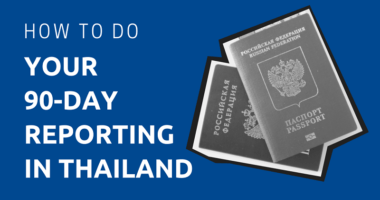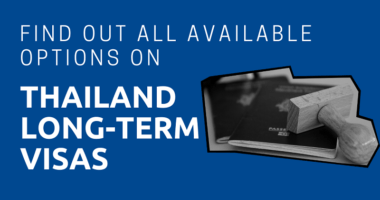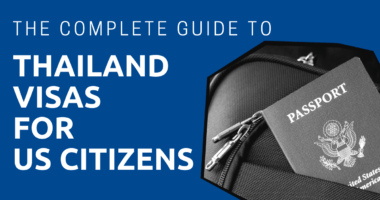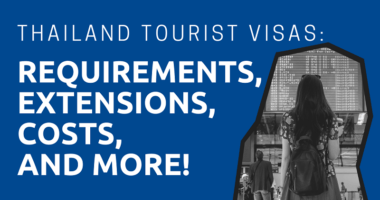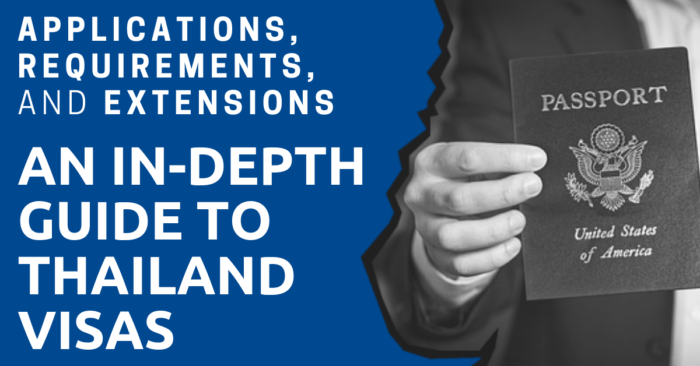
Foreigners visit Thailand for distinct reasons. Certain visits require a Thai Visa, while some don’t.
If you want to stay long-term, this guide has a comprehensive guideline, a list of useful resources, and up-to-date procedures to apply for a Thai Visa.
You can visit the Ministry of Foreign Affairs of the Kingdom of Thailand website for general visa information.
If you are looking for which visa choice is best for your stay, or processes for extending visas, changing one visa type to another, and more, this guide can help.
The information in this guide is sourced from credible news sources, Thai agency websites, forums, Facebook groups, interviews with visa experts, fellow expats’ experiences, and my personal experience as a tourist, then as an expat.
As of now, the Thailand Elite visa is the easiest long-term visa to get in Thailand. You can find out more about it in this guide.
In case you want to find out how to prepare your visa by yourself, the best time to go to the immigration offices, alternative visas allowing you to stay in Thailand—and get a list of Thai embassies that provide you with painless visa processes—then check out Premium Subscription.
It also show you how to live in Thailand hassle-free while saving $1000s a year.
"*" indicates required fields
Disclaimer: This article may include links to products or services offered by ExpatDen’s partners, which give us commissions when you click on them. Although this may influence how they appear in the text, we only recommend solutions that we would use in your situation. Read more in our Advertising Disclosure.
Contents
- Before You Leave Home
- Applying for Visas
- Visa Options
- SMART Visa
- Long-term Resident Visa (LTR)
- Single-Entry or Multiple-Entry Visa?
- Re-entry Permits
- Extensions
- 90-Day Reporting for Long-term Visas
- Cancellations
- Overstaying
- Land Border Crossing
- Visa Runs
- Visa Services
- Useful Sources of Thai Visa Info
- Thai Expat Communities
- Now, on to You
- Latest Guides on Thailand Visas
Before You Leave Home
Do I Need a Visa?
Depending on your nationality, duration of stay, and purpose of visit, you may or may not need to get a visa when entering Thailand.
If you come to spend your vacation in Thailand for a month, you may not need a visa. But if you want to travel for many months, then you need a tourist visa.
Please refer to this table to find out how many days you can stay in Thailand without a visa.
The type of visa you need depends on your purpose of visit. For example, if you come here for work, you need to get a business visa and a work permit.
You can check the visa options section below to find out all available visa types in Thailand.
Proof of Funds
Unless you have a valid visa, you may need to show proof of funds when entering Thailand.
The current requirement is 20,000 baht per person or 40,000 baht per family. It can be in cash or equivalent.
To find out how much money you should have with you, and in what cases this rule applies, read our guide on Thailand tourist visas.
Proof of Onward Travel
Aside from proof of funds, you are also required to show proof of onward travel. It can be a return ticket or a bus ticket to go to Thailand neighbor country.
For a more detailed explanation of what it means to have proof of onward travel.
Health Certifications
You may need to show an international health certificate as proof of yellow fever vaccination if you have been residing or traveling from countries such as Brazil, Argentina, Nigeria, or Ghana.
You can see a full list of countries here. Most of them are countries from South America and Africa.
Applying for Visas
You can apply for a Thailand visa in the following places depending on your nationality and visa type.
- Thai embassy/consulate in your home country–if your home country doesn’t have a Thai embassy, you need to do at a Thai embassy near your home country
- Any Thai embassy/consulate in the world
- Immigration Offices in Thailand
You can also check out our visa options section below to find out which places you can apply for a visa.
Requirements
Different rules apply to different nationalities, but one requirement governs everyone who’s applying for a Thai visa: you need a passport with at least six months validity and two blank pages on both side.
Aside from that, each visa comes with its own set of requirements. So read each section of this article carefully to find out which requirements you need for your visa.
Required Documents
Again, each visa type and nationality requires different documents. In addition, each Thai embassy and immigration office also need different documents. The best way to check is to contact the immigration office or Thai embassy you have to go.
Information on their websites might not be updated.
Application Form
You can download the application form on the immigration office or Thai embassy’s website where you are planning to go. Or you can get it at the immigration office or Thai embassy.
Fees
Visa fees are slightly different between each place due to the currency exchange rates. Generally speaking, it costs 2,000 baht per year for a single-entry non-immigrant visa and 6,000 baht per year for a multiple-entry non-immigrant visa.
Visa Options
These are your Thai visa options. Employment, education, business or investment, marriage, guardian, or retirement visas are generally the main visas you need to stay in Thailand for more than a year. However, they all have specific requirements.
We’ve gathered all the visa options here for easy reference.
One thing to remember is that acquiring a visa in Thailand requires a lot of processes and paperwork. And rules tend to get updated regularly. Sometimes you cannot find the exact information you need, even from official websites.
You can check out our Premium Subscription to get insider strategies how to make the visa yourself without wasting your time running back and forth to Thai embassies. It also shows you optional long-term visas allowing you to legally stay in Thailand.
Alternatively, you can check Thai Elite visa. It’s for anyone who can pay approximately 10,000 baht a month for the visa. Although it seems expensive, it saves you from the headache and accommodation fees of visa runs.
Tourism
When traveling to Thailand, you have many options when it comes to tourist visas. The length of your visa, the type of visa, and the requirements all depend on how long you’ll be staying in Thailand.
In general, 57 nationalities have a visa-exemption agreement with Thailand. So, they can come to Thailand without having to make a visa for 14 days to 90 days, depending on the nationality.
So, if your country isn’t on the visa-exemption list, or you want to stay longer than that, you need to get a tourist visa.
For information on traveling to Thailand as a tourist, check out Thailand Tourist Visas: Requirements, Extensions, Costs, and More!
Employment
Non-Immigrant Visa B (Work and Teaching)
The Non-Immigrant Visa B, commonly referred to as a Work Visa or Non-B visa, is for work, including teaching work.
In order to get a non-immigrant visa B, you need to get a job in Thailand or start your own company here.
Once issued, the holder of the Non-B visa is eligible to stay in Thailand for 90 days. It can be extended within the country after you get a work permit. The whole process is usually done with the assistance of the employer.
You can extend your visa to 1-2 years at the One-Stop Service Center for Visas and Work Permits in Chamchuri Square Building in Bangkok if the company you are working for is promoted by the Thailand Board of Investment.
If not, you need to apply for the 1visa extension at the immigration office.
Legally speaking, you can start working only after you get a work permit.
Since applying for a Non-immigrant B Visa and work permit go hand-in-hand, you and your employer needs to have the complete set of documents when applying for a work permit and a non-b visa.
Here’s a list of documents you need in general:
- University diploma or any similar educational certificate
- University transcript of records
- Certificate of Employment and Clearance – from the applicant’s previous employer clearing the applicant of any liability and/or showing proof of previous employment records; work permit application might require certificates from previous employers, depending on the applicant’s work history
- A CV outlining a clear timeline of the applicant’s employment history
If you’re unable to extend your single entry 90-day non-immigrant visa to 1 year, you can apply for a 7-day extension at the immigration office for a short-term fix. But once the initial 90-day period has expired, you will have to apply for a new visa from a Thai embassy.
However, if you have a multiple-entry non-immigrant visa and you tried to extend it within the first 90-day period/stamp and failed, you can exit and re-enter, and try to extend it within the second 90-day period.
Please note that in addition to non-B visa, there are also a non-immigrant visa IB (for business and other investment-related purposes) and non-immigrant visa B-A (for invest in or enter into a business partnership with a Thai-based company). But most embassies do not commonly issue these visas anymore.
They issue a non-immigrant B visa instead.
Find out more: An Expat’s Guide to Business and Work Visas in Thailand
Non-Immigrant Visa O for the purpose of doing Voluntary Services
This visa may be loosely referred to as a Volunteer Visa, which is for applicants rendering voluntary services in Thailand. This may include volunteer work for charities, foundations, elephant sanctuaries, or schools.
The main requirement for a volunteer visa is to get an acceptant letter from non-government organizations (NGOs) in Thailand that clearly states your position, responsiblities, and length of stay.
However, it’s getting harder to get a volunteer visa since many people have been abusing it. In case you have a volunteer visa before, it might also be harder to get other types of visas in Thailand.
So, if you want to get a volunteer visa, make sure to carefully choose an organization that you want to provide a volunteer work and do not abuse it to prevent any problem with your visa in the future.
Find out more: The Complete Guide to Becoming a Volunteer in Thailand
Non-Immigrant Visa M (Media Visa)
If you work in media, covering print, online, and television, apply for a single-entry Media Visa. Commonly referred to as journalism visa, it covers news reporters, film producers, and media correspondents of foreign news working for printed newspapers and magazines, TV, radio, or online agencies.
Some common concerns regarding the media visa:
- It applies only to those who are working for foreign news agencies. If you are a journalist working for a Thailand-based media company, a Non-Immigrant Visa B is the recommended visa.
- Applications and accreditation for a one-year Media Visa can be done online via the MFA Media Online Service website.
- Journalists who are working on short-term assignments should apply for a Non-Immigrant B visa, as well.
Requirements covering both long-term and short-term media assignments in Thailand, including frequently asked questions on accreditation, obtaining a press card and work permit, changing visa types from Tourist to Media–which can’t be done, visa for freelance journalists, visa renewal, obtaining a visa for media worker’s spouse or family, and other concerns, can be found in the Ministry of Foreign Affairs’ online guide.
Working Visa for Freelancers
Working in Thailand as a digital nomad on a tourist visa status puts you in a precarious situation with the Thai Government. Freelancers whose only requirements to work are a laptop, an internet connection, and ratty shirts legitimize their status by making deals with companies who offer work permits for a fee.
This process falls in a gray areas; it’s not government-endorsed but it also isn’t illegal. Nevertheless, it’s possible to get a working visa as a freelancer in Thailand for your line of work.
Our ExpatDen Thailand Community facebook group hosted a live question-and-answer session called “Ask Me Anything” and recently held one on visas and work permits. In the session, a visa lawyer, Pongkarn Khunphasee, who works at Banchee Legal House, offered expert advice on moving from a BOI employer to a non-BOI employer, setting up a foundation, and a few freelancer visa questions.
According to Khun Pongkarn, it’s possible for freelancers to get a work permit on a case-by-case basis. The successful application of a freelancer work permit is upon the discretion of the Labor Department officer and depends on the type of work.
To apply for a work permit as a freelancer, you have to submit all relevant documents about your freelance work, including all applicable licenses, type of services, and any other documents pertaining to your practice.
The officer at the Work Permit Division at the Labor Department will review and decide your fate. Renewal is subject to approval and the applicant’s practice will be subject to withholding tax.
However, it’s a real challenge to get a work permit through this procedure. Alternatively, you can consider becoming an employee under a BOI promoted company.
Getting hired by a BOI promoted company is legal. And the requirements are less stringent than starting your own business. Check out the relocation service to explore this option.
If you don’t need a work permit, you can check out the Elite Visa. It’s now becoming a popular option among digital nomads while giving you a 5-to-20-year visa in Thailand
Related article: The Complete Overview of Digital Nomad Visa in Thailand
Education
If you want to come to Thailand to study, getting an education visa, or a non-immigrant visa ED, will let you do so. It allows you to stay in Thailand for upto one year.
But where and what you want to study must be approved by Thailand’s Ministry of Education or the Thai Embassy at which you’re applying.
For a more detailed look at what you can study in Thailand, and the visa requirements and process, read our in-depth guide to education visas.
Marriage
You can get a marriage visa, known as non-immigrant visa O with an extension of stay based on marriage, if you legally married to a Thai spouse.
In addition to that, if you are a male, you need to make at least 40,000 baht per month or have 400,000 baht in your bank account.
You can apply for the marriage visa from your home country, and once you’re in Thailand, you will then apply for an extension of stay based on marriage to a Thai national, which will be valid for 1 year.
It’s also possible to do it in Thailand.
Check out our step-by-step guide on Thai Marriage Visas for more information.
Retirement
Non-Immigrant Visa O-A (Long-term Stay)
Looking to retire in Thailand?, this is a visa for you. Also called a Retirement Visa, the Non-Immigrant O-A-Long-term Visa lets you stay in Thailand for 1 year and can be renewed every year with the same requirements.
You can apply for a retirement visa if you are 50 years old and above, have no criminal record in your country of residence and in Thailand, have no prohibitive disease, and have the following financial requirements:
- Copies of bank statements showing a deposit of the amount equal to and not less than 800,000 baht in a Thai bank account
- Notarized bank statement copies that show income of not less than 65,000 baht, plus an affidavit from the foreign embassy or consulate as proof of income
- A combination of a deposit account and a monthly income in totaling at least 800,000 baht
There’s also a health insurance requirement for retiree. You need to have health insurance with 40,000 baht OPD coverage and 400,000 baht IPD coverage based on the
In some cases, additional documents such as an updated passbook, a bank letter confirming your funds were deposited from a foreign source not less than 2 months from the date of application, health certificate, and police clearance may be required.
Retirement visa holders are prohibited from engaging in any type of work.
The retirement visa can be single- or multiple-entry, costs US 200 dollars, and can be applied for in your home country or in Thailand. Retirement visa holders are also required to do 90-day reporting at the nearest immigration office in the area of residence and/or nearby police station.
For details on eligibility, requirements, application, and fees, read our Thailand retirement visa guide. Please note that requirements for each nationality can be different. If you have difficulty getting the retirement visa, it’s better to ask a visa lawyer for help.
10-year Thai Retirement Visa (Non-Immigrant Visa O-X)
You can get a 10-year retirement visa if you have one of the following 14 nationalities including Japan, Australia, Denmark, Finland, France, Germany, Italy, the Netherlands, Norway, Sweden, Switzerland, the United Kingdom of Great Britain and Northern Ireland, Canada and the United States of America.
Financial requirements are higher for the 10-year retirement visa at 100,000 baht monthly income or a minimum of 3 million baht deposited in a Thai bank account, which must remain in the account for at least 12 months.
Thailand Elite Visa Program (Privilege Entry Visa)
The Thailand Elite Visa Program, or Privilege Entry Visa, is a government-run visa program that caters to affluent foreigners who wish to stay long-term in Thailand and avoid visa runs and extensions.
Depending on the membership package, qualified foreigners can stay in Thailand for 5 to 20 years.
The Privilege Entry Visa is a multiple-entry visa granted to qualified Thailand Elite Visa Program members. With a Privilege Entry Visa, you can get:
- one-year extension of stays
- priority treatment at Thailand airport immigration counters
- prestigious golf club memberships
- first-class accommodations
- healthcare benefits
- airport services
- and more
To find out more or apply for the Privilege Entry Visa, please read our in-depth review of the Thailand Elite visa.
SMART Visa
The SMART Visa is like an upgraded version of a work visa in Thailand. It gives you an immediate four-year stay in the country. You can renew the visa as long as you fulfill the requirements, which tend to be a little more stringent than your standard Thai visa.
For example, to qualify for one of the SMART visas, you need a minimum income of THB200,000 per month and have at least 10 years of working experience.
The application process is also different from other visas. To get the SMART Visa, you need to apply on the Thailand Board of Investment (BOI) website. Once approved, you can go to a Thai immigration office or Thai embassy to get the visa.
There are four SMART Visa options:
- SMART Talent Visa
- SMART Investor Visa
- SMART Executive Visa
- SMART Startup Visa
Read our SMART Visa article for more information.
Long-term Resident Visa (LTR)
The long-term resident Thai visa, commonly known as LTR visa, was introduced in 2022.
Some call it a 10-year visa because it lets you stay in Thailand for one decade. It’s considered the best Thailand visa yet. But, because of the requirements, it isn’t for everyone.
For example, you need to have at least US$1,000,000 in assets and invest a minimum of US$500,000 in Thailand.
If you want to retire in Thailand with this visa, you need to be at least 50 years old and have a minimum income of U$80,000 a year. The income can come from pensions, social security, or other monthly investment payouts.
For those who aren’t yet retired, you can get the LTR if you make at least US$80,000 a year, have at least five years of working experience, and work for a company in Thailand.
Similar to the SMART Visa, to get the LTR visa you have to go through the BOI.
Read our guide to LTR visas for more information.
Other Purposes
Non-Immigrant Visa O Based on Dependent
Other popular name: dependent visa. This is for applicants who want to stay in Thailand with a family member that holds an appropriate visa such as a retiree visa or a working visa.
If you have a Thai family member in Thailand, this is also the visa for you.
The visa is granted with an initial 90 days, and can be extended at the Office of the Immigration Bureau in Thailand for up to 1 year.
You are allowed to work in Thailand with this visa as long as you are able to secure a work permit.
Non-Immigrant Visa O (Other)
Applicants can also apply for a Non-Immigrant Visa O for purposes other than what’s stated above, including staying after retirement, performing duties for a state enterprise or social welfare organizations, receiving medical treatment, acting as a Thai Government-required sports coach, or visiting as a contestant or witness for judicial procedures.
Non-Immigrant Visa F (Official Duty Visa/Courtesy Visa)
This is for those who have to perform official duties in Thailand, including as an officer on a diplomatic mission, Laissez Passer Passport holders and their families who will perform official duties in Thailand, ordinary passport holders who have received an invitation from the Royal Thai Government to attend a meeting, and ordinary passport holders that are recipients of a Thailand International Development Cooperation Agency scholarship.
For this visa, it’s best to check with the Royal Thai Embassy website based in your country as requirements vary for different nationalities. The Laissez Passer Passport is issued by a national government or an official international treaty organization such as the United Nations.
Non-Immigrant Visa R (Religious Visa)
This visa type is for ministers, priests, or missionaries who want to enter Thailand to perform missionary or religious work that is recognized by Thai Ministries or Government Departments. This visa is valid for 3 months but can be extended to 1 year.
Non-Immigrant Visa RS (Scientific Research)
The Scientific Research Visa is for those who are conducting scientific research or training or teaching in a research institute.
The Royal Thai Embassy, Helsinki website is a good source of information although for a highly specialized visa such as this, it’s best to check with the Royal Thai Embassy in your own country.
Diplomatic Visa
A Thai Diplomatic Visa may be granted and be valid for 3 or 6 months or longer, depending on the terms of the eligible passport-holder’s diplomatic mission or consulate or international organization. The diplomatic visa holder’s family may also be granted the same validity. Diplomatic and official visas are granted at no cost.
Single-Entry or Multiple-Entry Visa?
When you apply for a visa in Thailand, you’ll need to choose whether you want a single-entry or multiple-entry visa.
A single-entry visa costs THB2,000 and lets you enter Thailand one time. If you leave the country and don’t apply for a re-entry permit, your visa will be canceled when you arrive back in Thailand.
On the other hand, a multiple-entry visa costs THB5,000 and lets you enter and leave Thailand as many times as you want.
So, if you plan to leave Thailand at least three times a year, it’s better to get a multiple-entry visa from the start.
Re-entry Permits
If you have a single-entry visa and want to leave Thailand, you need to apply for a re-entry permit before exiting the country. Otherwise, your visa will be canceled once you return to Thailand.
You can get a re-entry permit at any of Thailand’s international airports or immigration offices. However, it’s always best to get one ahead of time at immigration. You never know what will happen once you get to the airport, and you don’t want to risk losing your visa.
Read our guide on how to get a re-entry permit in Thailand for more information.
Extensions
Anyone who is inclined to stay in Thailand beyond 30 days would, more or less, know how to extend a visa, but is often unsure of certain details. Here are some of the frequently asked questions:
Can a visa exempt stamp or tourist visa that was already extended for 30 days be extended for a further 30 days (60-day tourist visa + 30 days extension + 30-day extension)?
No. But in case of an emergency you may be granted a 7-day extension for 1,900 baht.
Once my 30-day extension has expired can I fly out and fly in and not get into trouble at Immigration?
It depends on the number of exit-reentries you’ve made.
Can I apply for a back-to-back tourist visa after my tourist visa’s 30-day extension?
You may get away with it, provided you apply in different embassies. Certain embassies may allow 2 consecutive applications. But, again, this is not set in stone.
How far in advance can I apply for a visa extension?
Immigration offices have different rules on this. Normally, you can extend your long-term visa 30 days or 45 days before it’s expired.
Have more questions?
You can find variations of these questions and concerns in our Thailand expat community. Knowing what others have experienced can be comforting, but remember that your passport and your travel records are different from others, and you’ll most certainly be dealing with officers of varying temperaments.
The general consensus is that only those who make questionable exits and entries–for example, applying for back-to-back tourist tourist visas or doing frequent visa runs–are the ones most likely to be interrogated.
90-Day Reporting for Long-term Visas
Long-term Thai visa holders – such as non-immigrant visas, retirement visa – are required to report their current address to the Immigration Bureau every 90 days, without exception. It can be done by the passport holder and, under certain circumstances, by an authorized representative.
It can be done 15 days before the due date or your 90th day in the country after your last entry, or 7 days after notification due date, but only in person. There’s a 2,000 baht fine for those who fail to do it within that given window.
You can do it in-person at the immigration office. You can report by mail 15 days before the notification’s due date. Or you can do it online.
Here’s how to do a 90-day report in detailed.
Cancellations
Something I’ve experienced several times is cancelling a Non-immigrant B Visa.
When I changed jobs, I explored the possibility of keeping my current Non-Immigrant B Visa and work permit, with non-encouraging results.
When an employer cancels your work permit, they also have to cancel your visa, per Thai Labor laws.
Workarounds are possible. A legitimate way to do this is to ask your former employer to extend your work permit’s cancellation. This happens more often than you think. This is a temporary fix though.
Previously, holders of a Non-immigrant Visa B managed to keep their visa up until the expiry date even after the work permit was canceled.
This was because Thai Immigration and the Labor Department function separately. The legality of this workaround is questionable and is best avoided.
You can read more about work permits in our in-depth guide, but in relation to keeping a visa the general rule is:
Terminated Employment = Cancelled Visa + Cancelled Work Permit
Cancelling your work permit and keeping the visa results in a 500 baht fine per day fine from when your work permit is cancelled. But the fine could be as high as 20,000 baht.
Overstaying
A word on overstaying in Thailand: don’t do it.
Other than paying the 500 – 20,000 baht-fine, overstaying for one day carries no severe consequences, especially if you’re flying out. But if you do get checked by the police on the streets or elsewhere, you will be arrested and fined. Based on reports, there is an ongoing crackdown on overstaying, which led to the arrest of overstayers found in entertainment complexes, hotels, condos, and other places.
You can be banned for 10 years for overstaying.
For foreigners with children, note that children below 15 years old do need a visa. In case they don’t, they will not be persecuted in case of overstay. Children ages 15-18 with no proper visa will be charged for overstaying but won’t be blacklisted. Any foreigner 18 years and older will be charged for overstaying and will be blacklisted.
Overstaying for one day is often seen as a victim-less crime, but it is a violation of Thai Immigration laws. If you’re thinking of overstaying, some people who’ve got away with it in the past may advise you to overstay and pay the fee. They may say overstaying is not a big deal. But remember: overstaying is a violation, which could result in imprisonment, years-long ban, or deportation.
Land Border Crossing
If you rely on visa-exempt entries and/or apply for tourist visas several times, then extend it for 30 days to prolong your stay in Thailand, although not illegal, then you will alert the Thai Immigration Office. If you’re staying long-term in Thailand without a visa, here’s a safe assumption to make: Thai Immigration officers are aware of border bounce because it’s not a recent trend.
Thai Immigration has cracked down on visa runs and multiple or back-to-back entries in the country. In general, you shouldn’t do a land border crossing for more than two times per calendar year.
Visa Runs
A visa run or a border bounce basically means doing a land border exit from Thailand and re-entering under a new stamp in order to renew one’s validity of stay. This entails exiting to any of Thailand’s neighboring countries.
Others opt to go by air and that’s a fairly legitimate way to do it, too.
Border bounce and visa runs are often interchanged, but a visa run is more appropriately referred to as the process of exiting the country to apply for a proper visa, which is done either by land or by air.
Doing a border bounce is perceived as illegal in some quarters because, as I’ve mentioned above, it has become prone to abuse. However, determining its legitimacy is a pretty loaded discussion since, on the one hand, it is prone to abuse. On the other hand, people who do it are not exactly violating Thai Immigration laws.
And border bounces are often necessary procedures for those who are about to apply for a legitimate visa and are merely extending their stay’s validity.
Visa Services
Although using visa services won’t guarantee you a visa, it increases your chances of getting a visa and significantly decrease all the hassle involved.
In general, visa services can prepare your paperwork and get you a queue number. This way you won’t have to wait the entire day at the embassy or immigration office.
If it’s a visa run service, they will arrange transportation and even accommodation to Thai embassies nearby Thailand, with Cambodia being the most popular destination.
You can check our exclusive content to find out more on recommended visa service providers.
Useful Sources of Thai Visa Info
While you can rely on networking and friendly advice from the kindred souls at Thailand Visa Advice. Some situations call for professional help.
To get visa-related answers that you can rely on, get help from a law firm that specializes in visa-related matters could be more accurate than a comment you’ve read on Facebook.
Thailand embassies websites now provides good guidelines on Thai Visas. Here’s a full list of the Royal Thai Embassy Consulates and Royal Thai Consulate-General worldwide.
Thai Expat Communities
Extending a visa at Chaeng Wattana in Bangkok is a straightforward process, but application procedures, fees, and rules change frequently. In case you need some visa advice on extraordinary scenarios, Our Expat community for Thailand can give you firsthand accounts of other expats’ experiences.
Now, on to You
When I applied for a tourist visa and a working visa (Non-immigrant Visa B), my experiences were different in Vientiane, Laos than they were in Penang and Kuala Lumpur, Malaysia.
Aside from arranging transportation and accommodations for your visa application, visa service agencies provide guidance on the application process. However, these trips can get chaotic, as you are applying with a large group of visa applicants. This is why applying for a visa in Vientiane is a crowded affair. But based off my experience, applying for a visa in Penang or Kuala Lumpur can be easier.
When you apply for a non-immigrant B visa, you will notice the differences in requirements, especially if you’re employed by different types of employers. If you’re applying for a non-immigrant B visa under a BOI-registered or multinational company, the application process can be smoother. The likelihood of being asked for a surprise requirement is rare. If you’re applying for a visa under smaller companies, it pays to double check the requirements of the embassy where you’re applying.
As detailed as this guide is, I have to reiterate that rules frequently change. Policy tweaks are not uncommon and you can expect more of these changes the longer you stay in Thailand.
In writing this guide, I linked to the most up-to-date sources – official embassies and Thai Visa guides – for visa application matters. I sought the knowledge and insight of visa service providers and fellow expats, both Asian and Western, who’ve been living in Thailand for years, and who’ve gone through an assortment of visa application processes, changes, and crackdowns.
Do you have a visa application story you feel is worth covering in this guide? If you feel like this guide missed vital information in the visa application process and experience, sound off in the comment section below.
Latest Guides on Thailand Visas
-
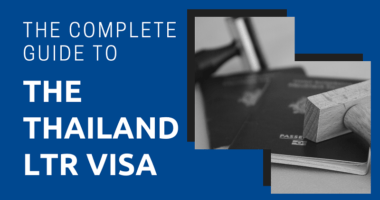 Thailand LTR Visa Review: Requirements and How to Get It 2024-02-12 The long-term resident visa in Thailand, also known as LTR visa, is a new, 10-year visa offered to investors, retirees,…
Thailand LTR Visa Review: Requirements and How to Get It 2024-02-12 The long-term resident visa in Thailand, also known as LTR visa, is a new, 10-year visa offered to investors, retirees,… -
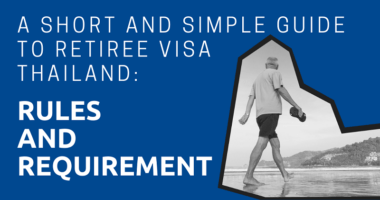 A Short and Simple Guide to Retiree Visa Thailand: Rules and Requirements (Updated 2024) 2024-02-06 Have you been thinking about retiring in Thailand? Wondering what the requirements are to get a long-term visa? In this…
A Short and Simple Guide to Retiree Visa Thailand: Rules and Requirements (Updated 2024) 2024-02-06 Have you been thinking about retiring in Thailand? Wondering what the requirements are to get a long-term visa? In this… -
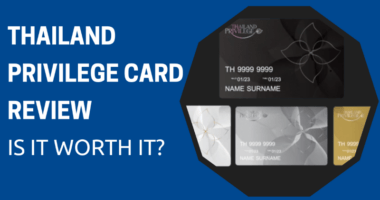 Thailand Privilege Card Program Review: Is It Worth It? (2024) 2024-01-05 Everything you need to know about the exclusive membership and benefits.
Thailand Privilege Card Program Review: Is It Worth It? (2024) 2024-01-05 Everything you need to know about the exclusive membership and benefits. -
 Best Place to Do a “Border Bounce” 2023-10-04 Doing a “border bounce” in Thailand is getting more difficult because immigration offices are getting more strict. Chances are, they…
Best Place to Do a “Border Bounce” 2023-10-04 Doing a “border bounce” in Thailand is getting more difficult because immigration offices are getting more strict. Chances are, they… -
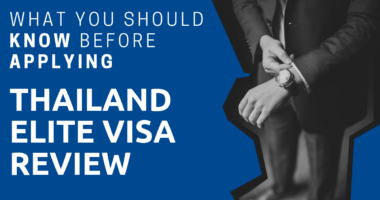 Thailand Elite Visa Review: What You Should Know Before Applying (2023) 2023-12-25 Have you heard of the Thailand Elite Visa? It was introduced in 2003 after the Thai government approved the Thailand…
Thailand Elite Visa Review: What You Should Know Before Applying (2023) 2023-12-25 Have you heard of the Thailand Elite Visa? It was introduced in 2003 after the Thai government approved the Thailand… -
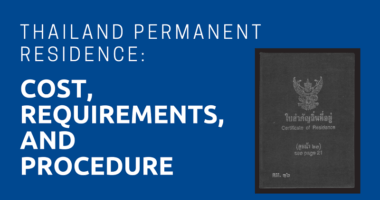 Thailand Permanent Residence: Cost, Requirements, and Procedure 2023-09-28 Are you thinking about living in Thailand permanently? If so, Thailand permanent residence might be something to look into. It…
Thailand Permanent Residence: Cost, Requirements, and Procedure 2023-09-28 Are you thinking about living in Thailand permanently? If so, Thailand permanent residence might be something to look into. It… -
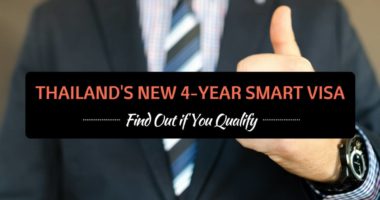 Thailand’s New 4-Year SMART Visa–Find Out if You Qualify 2023-10-03 Thailand’s Board of Investment has been issuing SMART Visas since 2018, and many expats and their families have benefited from…
Thailand’s New 4-Year SMART Visa–Find Out if You Qualify 2023-10-03 Thailand’s Board of Investment has been issuing SMART Visas since 2018, and many expats and their families have benefited from… -
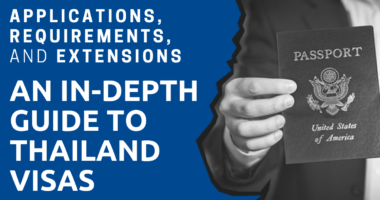 Non-Immigrant Visas to Thailand: an In-Depth Guide 2023-11-20 Foreigners visit Thailand for distinct reasons. Certain visits require a Thai Visa, while some don’t. If you want to stay…
Non-Immigrant Visas to Thailand: an In-Depth Guide 2023-11-20 Foreigners visit Thailand for distinct reasons. Certain visits require a Thai Visa, while some don’t. If you want to stay… -
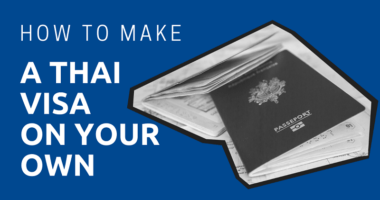 How to Make a Thai Visa on Your Own 2023-09-27 Visa matters seem to be a complicated issue for many people. When you search on the internet, many people say…
How to Make a Thai Visa on Your Own 2023-09-27 Visa matters seem to be a complicated issue for many people. When you search on the internet, many people say… -
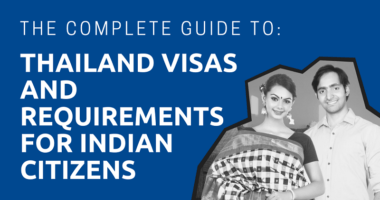 The Complete Guide to Thailand Visas and Requirements for Indian Citizens 2023-10-03 Are you an Indian citizen looking to visit Thailand? Whether you’re planning to explore the Land of Smiles to work,…
The Complete Guide to Thailand Visas and Requirements for Indian Citizens 2023-10-03 Are you an Indian citizen looking to visit Thailand? Whether you’re planning to explore the Land of Smiles to work,… -
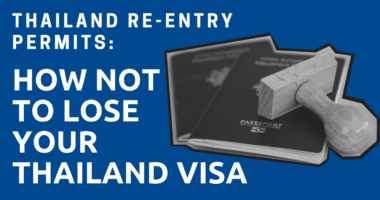 Thailand Re-entry Permits: How NOT to Lose Your Thailand Visa 2023-09-20 Are you a long-term visa holder who’s planning on leaving Thailand and needs a re-entry permit? Maybe you’re sitting in…
Thailand Re-entry Permits: How NOT to Lose Your Thailand Visa 2023-09-20 Are you a long-term visa holder who’s planning on leaving Thailand and needs a re-entry permit? Maybe you’re sitting in… -
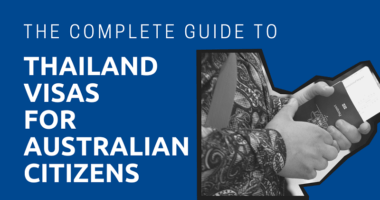 The Complete Guide to Thailand Visas for Australian Citizens 2023-10-03 Thailand is a popular destination for Australian visitors to travel and/or immigrate. If you’re an Australian who wants to live…
The Complete Guide to Thailand Visas for Australian Citizens 2023-10-03 Thailand is a popular destination for Australian visitors to travel and/or immigrate. If you’re an Australian who wants to live… -
 The Complete Overview of Digital Nomad Visa in Thailand 2023-10-03 Getting a visa is one of the biggest challenges of being a digital nomad in Thailand. As of July 2023,…
The Complete Overview of Digital Nomad Visa in Thailand 2023-10-03 Getting a visa is one of the biggest challenges of being a digital nomad in Thailand. As of July 2023,… -
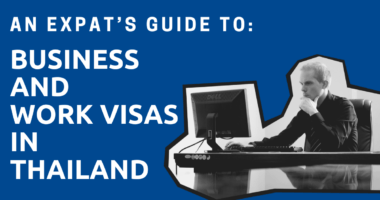 An Expat’s Guide to Business and Work Visas in Thailand 2023-10-03 When it comes to getting the right visa to work or do business in Thailand, you’ll often hear expats talk…
An Expat’s Guide to Business and Work Visas in Thailand 2023-10-03 When it comes to getting the right visa to work or do business in Thailand, you’ll often hear expats talk… -
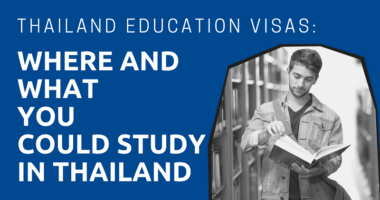 Thailand Education Visas: Where and What You Could Study in Thailand 2023-10-03 The Thai education visa. It’s not just for learning Thai. Despite popular belief, you can come to Thailand to study…
Thailand Education Visas: Where and What You Could Study in Thailand 2023-10-03 The Thai education visa. It’s not just for learning Thai. Despite popular belief, you can come to Thailand to study… -
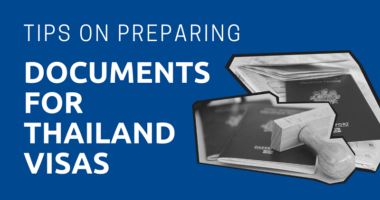 Tips on Preparing Documents for Thailand Visas 2023-07-05 Immigration offices send a shiver of fear through expats as there are long queues, impatient people, and paperwork which must…
Tips on Preparing Documents for Thailand Visas 2023-07-05 Immigration offices send a shiver of fear through expats as there are long queues, impatient people, and paperwork which must… - Increase Your Chances of Getting Your Visa Approved through Thai Immigration Etiquette 2023-07-05 This is one of the 100+ exclusive pieces of content created for our Premium subscribers. To read and unlock all…
-
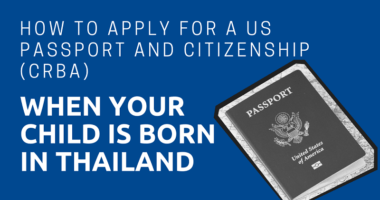 How to Apply for a US Passport and Citizenship (CRBA) When Your Child is Born in Thailand 2024-01-29 If you or your wife just delivered your baby in Thailand, the hospital staff may have helped you with your…
How to Apply for a US Passport and Citizenship (CRBA) When Your Child is Born in Thailand 2024-01-29 If you or your wife just delivered your baby in Thailand, the hospital staff may have helped you with your… -
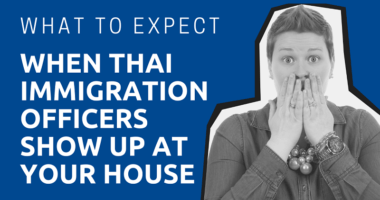 What to Expect When Thai Immigration Officers Show up at Your House 2023-07-05 Thai immigration officers may want to visit you if you’re on a long-term Thai visa. But don’t worry, if you’re…
What to Expect When Thai Immigration Officers Show up at Your House 2023-07-05 Thai immigration officers may want to visit you if you’re on a long-term Thai visa. But don’t worry, if you’re… -
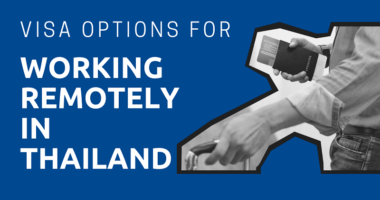 Visa Options for Working Remotely in Thailand 2023-07-05 Getting a visa is the first and most important part of working remotely in Thailand. As long as you’re qualified,…
Visa Options for Working Remotely in Thailand 2023-07-05 Getting a visa is the first and most important part of working remotely in Thailand. As long as you’re qualified,… - Recommended Thai Embassies Near Thailand to Apply for Visas 2023-07-05 This is one of the 100+ exclusive pieces of content created for our Premium subscribers. To read and unlock all…
- Recommended Visa Service Providers 2023-07-05 Sorting out your Thai visa and work permit involves a lot of paperwork. If you need professional assistance, you can…
- What to Do When an Immigration Officer Rejects Your Entry into Thailand 2023-07-05 You may have read online about people living in Thailand longterm with tourist visas. They say they just need to…
-
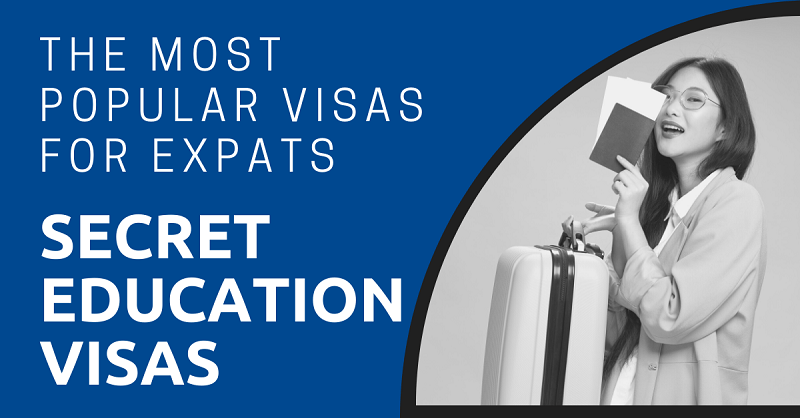 Secret Education Visas 2023-07-06 An Education Visa is one of the most popular visas for expats who want to stay in Thailand long-term. It’s…
Secret Education Visas 2023-07-06 An Education Visa is one of the most popular visas for expats who want to stay in Thailand long-term. It’s… -
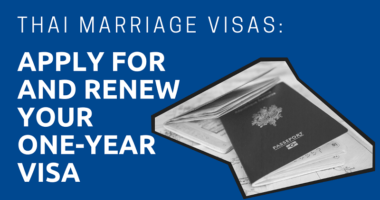 Thai Marriage Visas: Apply for and Renew Your One-Year Visa 2023-08-31 I stepped out onto the slushy streets of New York City. The wind ripped through my bones. Warm air billowed…
Thai Marriage Visas: Apply for and Renew Your One-Year Visa 2023-08-31 I stepped out onto the slushy streets of New York City. The wind ripped through my bones. Warm air billowed… - How to Stay in Thailand 270 Days with the Tourist Visa 2023-07-05 Visa should be one of the first things you take a look at when traveling to Thailand. Fortunately, Americans, British,…
-
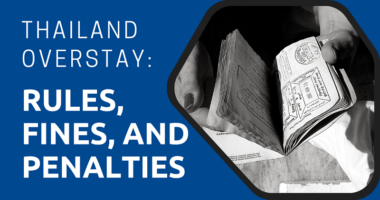 Thailand Overstay: Rules, Fines, and Penalties 2023-07-07 If you’re planning a trip to Thailand, it’s essential to be aware of the visa laws to avoid any penalties.…
Thailand Overstay: Rules, Fines, and Penalties 2023-07-07 If you’re planning a trip to Thailand, it’s essential to be aware of the visa laws to avoid any penalties.… -
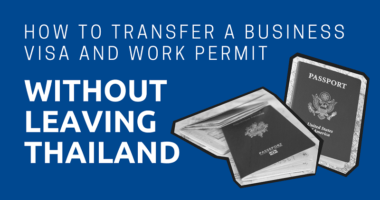 How to Transfer a Business Visa and Work Permit without Leaving Thailand 2023-07-05 You might have heard before that you need to leave Thailand and get a new business visa when changing jobs. …
How to Transfer a Business Visa and Work Permit without Leaving Thailand 2023-07-05 You might have heard before that you need to leave Thailand and get a new business visa when changing jobs. … -
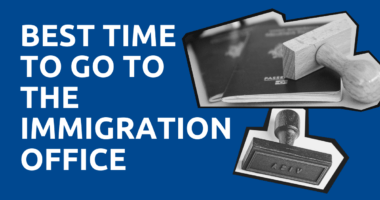 Best Time to Go to the Immigration Office 2023-07-05 Immigration offices in Thailand are notorious for their long queues, especially for tourist visas, education visas, and business visas. It…
Best Time to Go to the Immigration Office 2023-07-05 Immigration offices in Thailand are notorious for their long queues, especially for tourist visas, education visas, and business visas. It… -
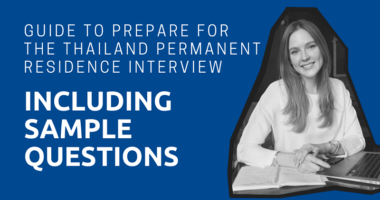 Guide to Prepare for the Thailand Permanent Residence Interview, including Sample Questions 2023-07-05 Are you planning to be a permanent resident in Thailand? There are various benefits of having permanent residence. You can…
Guide to Prepare for the Thailand Permanent Residence Interview, including Sample Questions 2023-07-05 Are you planning to be a permanent resident in Thailand? There are various benefits of having permanent residence. You can… -
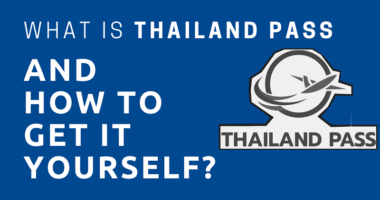 What is Thailand Pass and How to Get It Yourself? 2023-07-06 Thailand Pass is a new system to enter Thailand introduced by the Thai Government. Starting Novermber 1, 2021, everyone coming…
What is Thailand Pass and How to Get It Yourself? 2023-07-06 Thailand Pass is a new system to enter Thailand introduced by the Thai Government. Starting Novermber 1, 2021, everyone coming… -
 My Experience Going to Thailand During the COVID-19 Pandemic (March 2021) 2023-08-29 A breakdown of the procedures and costs of returning to Thailand from Canada for my family of three.
My Experience Going to Thailand During the COVID-19 Pandemic (March 2021) 2023-08-29 A breakdown of the procedures and costs of returning to Thailand from Canada for my family of three. -
 AMA With Pongkarn Khunpasee: Visas, Work Permits, and More 2023-06-29 If you missed our ExpatDen Facebook Community group’s inaugural 2018 AMA—or Ask Me Anything—no worries. We have you covered. After…
AMA With Pongkarn Khunpasee: Visas, Work Permits, and More 2023-06-29 If you missed our ExpatDen Facebook Community group’s inaugural 2018 AMA—or Ask Me Anything—no worries. We have you covered. After…




